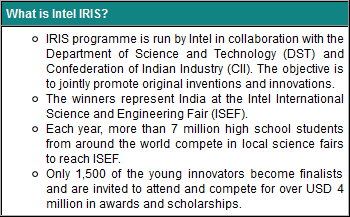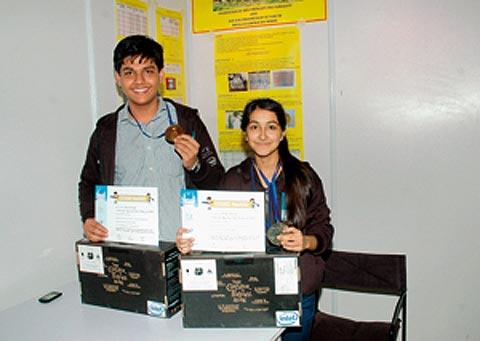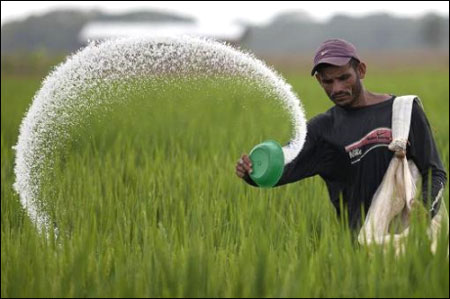Photographs: Careers360 Urmila Rao, careers360
A curious, inventive school student is among the 1200 international students whose science project has made the cut for an international science competition, the grand prize for which is a trip to the Nobel Prize Ceremony in Stockholm.
Saral Baweja's voice quivers with excitement as the 15-year-old explains a few biological terms related to his research paper.
Titled 'Production of Bio Soil-Enhancer by Phosphate Solubilising action of Bacillus Subtilis on bones' the paper received a reputed science award.
In a nutshell, Saral's work is related to the production of organic fertiliser.
And now he is awaits May 13, the day he goes to the US as one of the six select winners representing Team India.
Please click NEXT to continue reading
In his research, Saral used bone meal as an ingredient for fertiliser
Image: Image for representation onlyPhotographs: Reuters
A student of Maharaja Agrasen Public School, Ashok Vihar, in New Delhi, Saral presented his research synopsis in Initiative for Research and Innovation in Science (IRIS) programme, run by the CSR arm of Intel, the makers of computing devices.
His synopsis was shortlisted from a stack of project submissions. After winning the national level along with eight others, he bagged the honours to represent India in the final round.
Saral says that his research paper actually started with a Chemistry project aiming to make ammonium nitrate safe.
However, while researching on this substance, he along with his team-mate, Nishi Paliwal, came across a unique property of a Bacillus subtilis, a kind of bacteria.
Saral and Nishi discovered that the bacteria can solubilise phosphorus, one of the components found in chemical fertilisers.
"We noticed that the bacteria have the ability to convert insoluble phosphorous into soluble phosphorous, making fertiliser organic in nature," shares Saral.
But what would be the source of the phosphorous?
"Animal bones," pat comes the reply.
"Waste product from poultry and livestock industry," explains Saral.
In his research, Saral used bone meal, a mixture of crushed bones with a portion of soil.
"Bone meal is already used as a slow release fertiliser and can be easily procured from a fertiliser shop," he updates.

'The short-term goal of increasing plant yield ends up harming environment and soil'
Image: Image for representation purpose onlyPhotographs: Reuters
Saral is aware of the harmful effects of chemical fertilisers.
The short-term goal of increasing plant yield ends up harming environment and soil in the long run.
"But our organic substitute will do no such harm with a produce that is healthier and better," he shares. The fertiliser is also a fungicide and waste bones also get utilised.
Would he patent his product?
"No, I won't but I may publish a research paper."
What about the product's commercial usage?
"Why not? It will help us boost our produce and I can do that much for my country," says Saral.
The school provided financial support for his project
To realise one's dreams, support is essential.
While Saral is inspired by Stephen Hawking and Issac Newton, Pallavi Goel, a chemistry teacher and Dr. Lata, principal scientist at IARI, Pusa were instrumental in mentoring him.
His mother Daman Baweja, a geography teacher in his school and father Rakesh, a finance consultant, gave him wings.
Last but not the least, his elder brother was always around when Saral had to off load some of his concerns.
Thanks to support from all quarters, Saral was able to complete his synopsis within a month's time alongside initial experiments.
The school provided financial support for his project.
Illustration: Dominic Xavier
The grand prize is a trip to the Nobel Prize Ceremony in Stockholm
Photographs: Rediff Archives
Curiosity. It gets better of him every time. And Google search is his friend.
"Just recently, I was reading about planet Saturn, its ring and Moon system," he opens up when nudged a little.
But right now, he is busy finding out more about Pittsburg, his destination in the US; on its climate, demographics and other interesting details.
"At Intel ISEF, I will present our project to a panel of judges," shares Saral.
He gives us a peek into the agenda. 1200 students from over 40 countries will come together and compete for over 900 prizes! The grand prize is a trip to the Nobel Prize Ceremony in Stockholm.
Saral is looking forward to the event.
"There will be so much to learn." And of course the possibility of winning a prize.
But don't label Saral a bookworm just yet. While he harbours a desire to be an astro physicist or a nuclear physicist, he has now developed deep interest in Organic Chemistry due to his project.
He finds time to watch tele-series such as Friends and loves cooking, too!
And he gives us a lot of food for thought.
Tips for success
- Be passionate about Science, this is a must.
- The research-based project is not easy. It requires a lot of determination and if you are not passionate about it, you are likely to lose interest.
- Keep your synopsis short and scientific.
- The synopsis should be formal, explain features about your work.
- Avoid "cut-copy-paste" job from Internet.
Illustration: Dominic Xavier







Comment
article